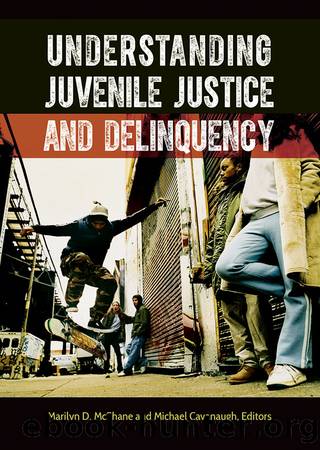Understanding Juvenile Justice and Delinquency by Unknown

Author:Unknown
Language: eng
Format: epub
ISBN: 9781440839634
Publisher: ABC-CLIO
Successful Research Studies
The 1996 Adverse Childhood Experiences (ACE) study sought to explore the relationship between childhood abuse and household dysfunction and health risks. The study collected questionnaires from 9,508 adults seeking standard medical attention from a large Kaiser Permanente hospital. The questionnaire was broken down into seven categories of adverse childhood experiences: one being living with family members who were ever incarcerated. The results showed that among persons that experience a family member’s incarceration, 62 percent of the same persons lived with someone with substance abuse. With that said, more risk exposure was equated to more likelihood of health-related issues, such as smoking, severe obesity, depressed mood as well as suicide attempts.53 Thus, a child experiencing a family member’s incarceration was also experiencing substance abuse in the home, resulting in exposure to a total of two adverse childhood experiences. Another data set with information specific to children of incarcerated parents is the Fragile Families and Child Well Being (FFCWB) study in which researchers have followed families for nine years.54 In wave 5 alone, the number of fathers who had ever spent time in jail or prison was 719 as reported by the mother. This study has been used to investigate associations between children’s behavior and paternal incarceration using secondary data analysis. Longitudinal data is difficult to collect as a result of attrition within these children and their families. Often times, children with incarcerated parents are known to move around from residence to residence. Also, many times these same participants drop out of a study once a parent is released from prison.
Another study is Project S.E.E.K., which is a longitudinal study of children with incarcerated parents. Launched in 1989–2004, Project S.E.E.K was the first extensive program for kids and involved weekly two-hour support group meetings, home visits, advocacy, referrals, stress management training for caregivers, and helping families communicate with incarcerated parents by providing supervision for child visits. Findings from interviews conducted with project S.E.E.K participants included the following: children were often given false or misleading information about their parent’s incarceration, children experienced financial instability, and negative effects of incarceration were reduced as a result of receiving support and skills-improvement training from the program.
Download
This site does not store any files on its server. We only index and link to content provided by other sites. Please contact the content providers to delete copyright contents if any and email us, we'll remove relevant links or contents immediately.
Cecilia; Or, Memoirs of an Heiress — Volume 1 by Fanny Burney(32559)
The Great Music City by Andrea Baker(32020)
Cecilia; Or, Memoirs of an Heiress — Volume 2 by Fanny Burney(31957)
Cecilia; Or, Memoirs of an Heiress — Volume 3 by Fanny Burney(31943)
We're Going to Need More Wine by Gabrielle Union(19049)
All the Missing Girls by Megan Miranda(16033)
Pimp by Iceberg Slim(14513)
For the Love of Europe by Rick Steves(14135)
Bombshells: Glamour Girls of a Lifetime by Sullivan Steve(14077)
Talking to Strangers by Malcolm Gladwell(13374)
Norse Mythology by Gaiman Neil(13371)
Fifty Shades Freed by E L James(13244)
Mindhunter: Inside the FBI's Elite Serial Crime Unit by John E. Douglas & Mark Olshaker(9345)
Crazy Rich Asians by Kevin Kwan(9293)
The Lost Art of Listening by Michael P. Nichols(7507)
Enlightenment Now: The Case for Reason, Science, Humanism, and Progress by Steven Pinker(7315)
The Four Agreements by Don Miguel Ruiz(6766)
Bad Blood by John Carreyrou(6623)
Weapons of Math Destruction by Cathy O'Neil(6282)
